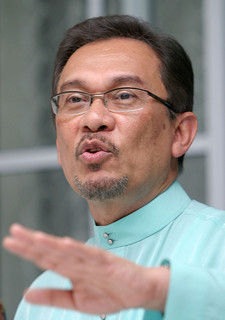Anwar Ibrahim

Dato' Seri Anwar Ibrahim is Malaysia and leader of the reform oriented Opposition Coalition, Pakatan Rakyat.
Anwar was invited to join the United Malays National Organisation (UMNO), the ruling party, and the government in 1982, by then Prime Minister Mahathir Mohamad. His rise in the party and in the government was meteoric. He was elected in 1984, as Leader of UMNO Youth and in 1986, became a Vice-President of UMNO. He served as Minister of Culture, Youth and Sports in 1983; Minister of Agriculture in 1984; and Minister of Education in 1986, prior to his tenure as Finance Minister and Deputy Prime Minister in the 90s.
Anwar Ibrahim was the Deputy Prime Minister of Malaysia from 1993-1998. He also served as Minister of Finance, Minister of Culture, Youth and Sports in 1983; Minister of Agriculture in 1984; and Minister of Education in 1986. He was also Chairman of the Development Committee of World Bank and International Monetary Fund in 1998 and president of UNESCO’s General Conference. As a student leader he was the founder of Malaysia’s Muslim Youth Movement and has extensive experience working with Muslim political parties. From 1975 till 1982 he was representative for Asia Pacific of World Assembly of Muslim Youth under Sheikh Hassan Abdullah.
In 1988, Anwar Ibrahim became the second President of International Islamic University of Malaysia. The idea of the establishment of IIUM arose in the Congress of Malaya Islamic University which was organized by The National Organization of Islamic Students of Malaysia (PKPIM) in 1971. The then President of PKPIM was Anwar Ibrahim. This resolution urged the authority to upgrade the Islamic Malayan College. In 2010, Association of Muslim Social Scientist UK awarded it’s prestigious lifetime achievement award to Anwar Ibrahim in recognition of long and distinguished service in the field of politics and economic thought, the promotion of the cause of good governance and commitment to the principles of freedom, tolerance and justice.
Highly respected for his principled stance against corruption and his skillful management of the Malaysian economy during the turbulent period of its financial crisis, Anwar is also viewed as one of the forefathers of the Asian Renaissance and a leading proponent of greater cooperation among civilizations. He is an ardent supporter of democracy and is an authoritative voice in bridging the gap between East and West. As a public servant in Malaysia, Anwar was unrelenting in his campaign against corruption and has been committed to the ideals of empowerment, justice, and equity. He has stressed the need for internal reforms in order to reinforce civil and democratic institutions and to expand the democratic space.
Some of these themes, articulated in his book Menangani Perubahan (Managing Change) and Asian Renaissance. As acting Prime Minister in 1997, for example, he introduced Anti-Corruption Legislation which held public officials accountable for corrupt practices even after their departure from public service. His emphasis on social justice, poverty eradication, education and civil society has guided his career in government to the present.
He has lectured extensively around the world on governance and accountability, the relationship between Islam and democracy, the need for greater civilizational dialogue and contemporary politics in Malaysia and Southeast Asia. His articles and speeches on these subjects have been published widely in leading newspapers and journals around the world. He is respected internationally as a leader in interreligious dialogue and Muslim Christian relations and was one of the early signatories to the Common Word initiative. He has also held lecturing positions at the Johns Hopkins School of Advanced International Studies and St. Anthony’s College at Oxford University.
